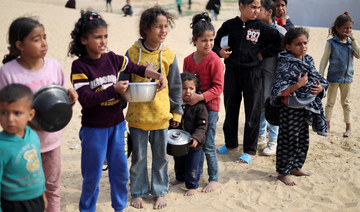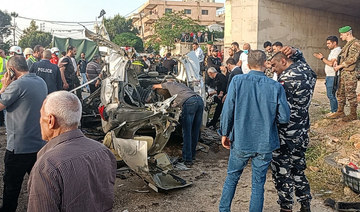LONDON: Israel’s military operation in Gaza has raised questions about potential scenarios for postwar governance and security. The emerging consensus view — at least for now — seems to be the need for a two-state solution.
There are several barriers to the creation of an independent Palestinian state alongside Israel, however. One immediate stumbling block is that the dream of Palestinian statehood rests on the fortunes of the incumbent administrations in Israel and the US.
The normally close allies appeared more divided than ever since Washington’s abstention in a UN Security Council vote on March 25 resulted in the passing of a resolution demanding an immediate ceasefire.
Relations soured further after seven aid workers from World Central Kitchen were killed on April 1 in a series of Israeli airstrikes while distributing food in the Gaza Strip, leading to additional censure by Washington.

US President Bill Clinton (L) watches as Palestinian leader Yasser Arafat (C) confers with Israeli Prime Minister Ehud Barak (R) on July 11, 2000. (AFP/File)
Even before these events, the US government had voiced open support for a Palestinian state. In his State of the Union address on March 8, US President Joe Biden made clear that “the only real solution is a two-state solution.”
However, Biden faces a tight election slated for Nov. 5. If he loses to his Republican challenger, Donald Trump — who was an ardent supporter of Israel’s hard-right policies during his last presidency — a two-state outcome seems unlikely.
Indeed, chatter among Trump loyalists suggests the former president may be leaning toward support for the removal of Palestinians from Gaza once and for all, with the starkest indication coming from his son-in-law and former Middle East adviser Jared Kushner.
Asked at the Harvard Kennedy School in March whether he expected Benjamin Netanyahu to block Gazans from returning in the event they were removed en masse, Kushner said: “Maybe,” before adding: “I am not sure there is much left of Gaza.”
On March 5, Trump told Fox News that Israel had to “finish the problem” in Gaza. When asked about a two-state solution, Trump avoided the question, simply stating: “You had a horrible invasion that took place that would have never happened if I was president.”
On April 18, 12 countries at the UN Security Council voted to back a resolution recommending full Palestinian membership. Only the US voted against, using its veto to block the resolution.
The draft resolution called for recommending to the General Assembly “that the State of Palestine be admitted to membership of the United Nations” in place of its current “non-member observer state” status, which it has held since 2012.

Palestinians look at smoke billowing during Israeli bombardment on the Firas market area in Gaza City on April 11, 2024. (AFP/File)
The majority of the UN’s 193 member states — 137, according to a Palestinian count — have recognized a Palestinian state.
Regardless of the outcome of the draft resolution, the fate of Palestinian statehood also rests on the actions of the Israeli government and the views of a divided public.
Polling data from the Pew Research Center suggest that dwindling support for a two-state outcome in Israel has been driven primarily by the country’s Arab population.
In 2013, some 74 percent of Arab Israelis said that they believed an independent Israel and Palestine could coexist, with this number dropping to 64 percent in 2014 before plummeting to 41 percent in April last year.
Conversely, belief in peaceful coexistence among Jewish Israelis has fluctuated between 46 and 37 percent over the past 10 years, dropping to 32 percent before the Oct. 7 attacks.
INNUMBERS
• 41% Arab Israelis who believe peaceful coexistence is possible, down from 74 percent in 2013.
• 32% Jewish Israelis who believe peaceful coexistence is possible, down from 46 percent in 2013.
(Source: Pew Research Center survey conducted in September 2023)
Crucially, however, support for a single Israeli state has never been a majority view, with some 15 percent undecided, suggesting that the hesitancy in support for it is based on not knowing what such a system would look like in practice.
This assessment reflects that of Benjamin Case, postdoctoral research scholar at Arizona State University, who said that with the right framing, Israelis could come around to supporting a two-state solution.
“Public opinion shifts in response to horizons of political possibility,” Case told Arab News. “Israelis want the return of their loved ones who are held hostage, and they want guaranteed safety — and of course they want things that most people want, like healthy, prosperous lives.
“If a real solution is offered that brings peace and security, I think most Israelis will eventually get behind it.”

Palestinian Authority President Mahmud Abbas poses for a picture with new Palestinian government on March 31, 2024, in Ramallah. (AFP/File)
Lawmakers in Washington, it seems, are trying to provide such a framing. On March 20, a group of 19 Democratic senators issued a public call for Biden to establish a “bold, public framework” for the realization of the two-state solution once the war in Gaza is over.
Cognizant of the ongoing security concerns in Israel, the call suggested a model based on a “non-militarized Palestinian state.”
It called for the unification of both Gaza and the West Bank under the Palestinian flag, and said that this newly recognized country could be governed by a “revitalized and reformed Palestinian Authority.”
Case said that while it is important to recognize Israeli security concerns in forging a Palestinian state, any model needed to pay particular attention to the rights of Palestinians.
He stressed that Palestinian human rights “must come before the preferences of Israelis,” but said that meeting those needs with a Palestinian state was a “sensible solution for the extreme violence in Israel and Palestine.
“A Palestinian state would likely deprive Hamas of its reason for existing,” he said. “Hamas grew out of conditions of prolonged occupation, and thrives on the conflict.
“What popularity it has among Palestinians comes less from its governance and more because it represents resistance against occupation in a hopeless situation. If a path to a Palestinian state is realized, Hamas would have to reform significantly or would lose power.”
Mouin Rabbani, co-editor of the independent Jadaliyya ezine and a former analyst for International Crisis Group, is concerned that despite growing Western support for a two-state solution, the world appears no closer to achieving this goal.

US Secretary of State Antony Blinken meets with Palestinian President Mahmoud Abbas in the city of Ramallah in the occupied West Bank on February 7, 2024. (AFP/File)
“I don’t think a two-state settlement is now closer than previously,” Rabbani told Arab News. “The passage of time makes it increasingly difficult to achieve.
“A two-state settlement is a question of political will, not of artificial points-of-no-return. On this score, political will among Israel and its Western sponsors to end the 1967 occupation, without which there can be no two-state settlement, has been systematically non-existent.”
Nonetheless, he said, “in view of recent developments,” it was pertinent to pose “related but no less important questions” on the desirability of a two-state outcome and its durability in light of what he described as “the genocidal, irrational apartheid regime that is Israel.”
Regarding the positions of countries in the Arab world, he suggested there was “diminishing purchase” on the desire for peace with Israel.
Contesting Rabbani’s position, Case believes Palestinian statehood is now closer to becoming reality than it was on Oct. 6, and that the “gross disproportionality” of Israel’s response to the Hamas terror attack had played its part in this.”
“Ironically, had Israel shown restraint following the Oct. 7 attack, it may well have been the opposite,” he said.
“The brutality of the Hamas assault would likely have fostered unprecedented international sympathy for Israel, entrenching Israeli occupation policies.

US President Bill Clinton (C) stands between PLO leader Yasser Arafat (R) and Israeli Prime Minister Yitzahk Rabin (L) as they shake hands for the first time, on Sept. 13, 1993. (AFP/File)
“However, the Israeli military response, especially the shocking scale of civilian casualties in Gaza, as well as the genocidal remarks made by many Israeli officials toward Palestinians, have reversed the backfiring effect, raising international awareness about the injustices of the occupation and generating urgency to find a durable solution.”
The two-state solution, a proposed framework for resolving the Israeli-Palestinian conflict, was first proposed in 1947 under the UN Partition Plan for Palestine at the end of the British Mandate.
However, successive bouts of conflict, which saw Israel expand its area of control, put paid to this initiative.
Then in 1993, the Israeli government and the Palestine Liberation Organization agreed on a plan to implement a two-state solution as part of the Oslo Accords, leading to the establishment of the Palestinian Authority.
This Palestinian state would be based on the borders established after the 1967 war and would have East Jerusalem as its capital. However, this process again failed amid violent opposition from far-right Israelis and Palestinian militants.
Since then, the growth of Israeli settlements in the West Bank, reciprocal attacks, the undermining of the Palestinian Authority, and ever harsher security controls imposed by Israel, have left the two-state solution all but unworkable in the eyes of many.
For others, it remains the only feasible option.

























